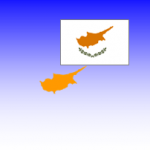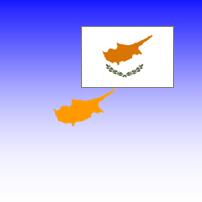Konstantinos Athanasiadis

Abstention ruled supreme in the European elections held on the divided island of Cyprus (divided between the Republic of Cyprus and the so called “Turkish Republic of Northern Cyprus” recognised only by Turkey). According to the Ministry of the Interior more than the half of the electorate (56%) (Ministry of the Interior 2014) opted for abstention from the electoral process as a token of growing discomfort against the political system and the austerity measures put forward since last year. Paradoxically though, the high abstention rate provided a crucial lifeline to the political system of Cyprus as it enhanced the rather meagre results of almost all political formations on the island.
The results
Specifically, the governing centre-right party of the Democratic Rally (DISY) managed to hold its ground despite the unpopular reform package implemented as part of the rescue plan between Cyprus and the EU. Thus, the party of the currently serving President of the Republic of Cyprus (Cyprus has a presidential system), Nicos Anastasiades gained 37.8% of the votes increasing by 1.8% its share in comparison to the last European elections of 2009. Interestingly, this figure reflects the highest score achieved in the European elections for the party of the Cypriot centre-right.
| Konstantinos Athanasiadis is a PhD Candidate at LUISS Guido Carli University. Mr Athanasiadis earned an MSc in International Politics from SOAS, University of London and a BA in International and European Studies from the University of Macedonia, Thessaloniki. His research interests include among others international relations and comparative politics. |
Yet it should be noted that DISY was joined in this campaign by the European Party (EVROKO), which in the last 2009 elections received 4.2% of the Cypriot vote. Interestingly, EVROKO has actually ‘repatriated’ since it seceded from DISY in 2004, due to the latter’s support for the island’s reunification plan sponsored by the then serving UN Secretary General Kofi Annan (2004).
The former Communists of the Progressive Party of the Working People (AKEL) came at the second place attaining 27% of the votes, which represented a 8% diminution of its political influence since 2009. Both DISY and AKEL won 2 seats out of 6 that Cyprus is allotted in the European Parliament. Moreover, the centre-left leaning Democratic Party (DIKO) also saw its forces growing diminishing in comparison to the 2009 elections for the European Parliament (-1.5%) as in the meantime it struggled to overcome internal frictions that reflected differences of opinion related to its participation in a coalition government with DISY (it won one seat). The social democratic party of EDEK secured the last seat, whilst losing 3.8% of its 2009 share (Table 1). Finally, Symmachia Politon (Citizens’ Alliance) led by Giorgos Lillikas -former Foreign Minister and candidate in the last presidential elections (2013)- failed to elect any representative gaining 6.8% of the votes.
Ironically, the face-saving value of abstention is mirrored clearly if the electoral results are translated into absolute terms (number of votes gained in 2009 elections). The conservative ruling-party of DISY loses 14% of the popular vote, AKEL 35.5%, DIKO 25% and EDEK43% (Persianis 2014).
| Table 1 – Results of the 2014 European Parliament elections – Cyprus | ||||||
| Party |
EP Group |
Votes (%) |
Seats |
Votes (change from 2009) |
Seats (change from 2009) |
|
| Democratic Rally (DISY) |
EPP |
37.8 |
2 |
+1.8 |
+0 |
|
| Progressive Party of the Working People (AKEL) |
GUE-NGL |
27.0 |
2 |
-8.4 |
+0 |
|
| Democratic Party (DIKO) |
S&D |
10.8 |
1 |
-1.5 |
+0 |
|
| Movement for Social Democracy EDEK-Green Party (KS/EDEK) |
S&D |
7.7 |
1 |
-3.8 |
+0 |
|
| Citizens’ Alliance (Symmachia Politon) |
6.8 |
0 |
+6.8 |
|||
| Other |
9.9 |
|||||
| Total |
100 |
6 |
_ |
|||
| Turnout (%) |
44.0 |
-15.7 |
||||
| Legal threshold for obtaining MEPs (%) |
none |
|||||
| EP group abbreviations: EPP=European People’s Party; S&D=Progressive Alliance of Socialists and Democrats; ALDE=Alliance of Liberals and Democrats for Europe; G-EFA=The Greens–European Free Alliance; ECR=European Conservatives and Reformists; GUE-NGL=European United Left–Nordic Green Left; EFD=Europe of Freedom and Democracy; NI=Non-Inscrits. | ||||||
The campaign
Public discussions in the period that preceded the elections were dominated by the so called ‘national issue’ –that is the renewed effort towards reunification-, and the struggle to overcome the effects of the financial crisis. Related to attempts of economic recovery is the endeavour by the government of Cyprus to turn the country into a transit point of energy networks that bind together the Middle East and the EU in consistence with the latter’s policy of energy diversification. Hence, public discourse was captured to a great extent by the endeavour to extract natural gas from the Cypriot continental shelf that aims exactly at underlining the island’s geostrategic value for the EU. The official visit paid by the US Vice President John Biden in Cyprus just a few days before the European elections, and the results ensuing from it did contribute further to ‘displace’ discourse on the EU elections to the fringes of public dialogue.
Equally preponderant to the discussions on energy security is the impact of the financial crisis that badly hit the island’s thriving services’ sector. Cyprus has signed in March 2013 a bailout agreement with the Eurogroup, the European Commission, the European Central Bank (ECB) and the IMF that entailed an €10 billion funding package in exchange for significant reforms in the banking sector, increased scrutiny over money-laundering and privatisations that endangered the country’s status as tax haven. Therefore, the debate on the role of the EU was framed also in connection to the ramifications of the Memorandum of Understanding (MoU) and the consequences associated to it such as the rising unemployment, the deconstruction of the welfare state and reduced salaries.
It is against this background that the low turnout should be interpreted. Cypriots chose to demonstrate their disapprobation to the political system by turning their backs to the elections for the European Parliament. Low turnout should also be evaluated as a sense of dissatisfaction and injustice committed against the citizens of Cyprus as reflected in the painful bailout plan.
It is noteworthy, that according to the latest Eurobarometer, Cypriots show an immense distrust to their political parties (91%) thus revealing a raging latent institutional crisis. Pessimism regarding the prospects of the national economy is also pervasive since Cypriots evaluate as ‘bad’ the state of the national economy (97%) coming second after the Greeks. Regarding the EU, Cypriots feel that it is responsible for the austerity (77%), whilst the vast majority (86%) expresses its reluctance whether Brussels takes into serious consideration its preoccupations (Phileleftheros 2014).
An interpretation
In conclusion, the conservative Democratic Rally shines as one of the few examples of ruling parties that managed to increase their share in the European elections. Although its share in absolute numbers followed the general decreasing trend as mentioned above, its gains in proportional terms must be appraised as an indication of support for reforms and recovery by a significant segment of the electorate. Besides, the opposition leftist AKEL is undergoing a process of re-organisation that followed its defeat in the 2013 presidential elections, which is to be attributed partially to the controversial management of the national economy by the then serving leftist President of the Republic, Demetris Christofias.
Therefore, the results of the European elections in Cyprus do not imply an earthquake of the magnitude observed elsewhere. Yet abstention confirms that Cypriots feel disillusioned with the EU, and ultimately with their political system. Moreover, abstention rings the bell of a looming social crisis, which for the time being remains latent as the Republic of Cyprus tries to tackle the challenges of reunification, economic recovery and energy security.
References
Kathimerini. “Apochorei to DIKO apo Kyvernisi Anastasiade” (DIKO withdraws from Anastasiade’s Government). Kathimerini, 22 February, 2014. https://www.kathimerini.gr/755169/article/epikairothta/kosmos/apoxwrei-to-dhko-apo-kyvernhsh-anastasiadh
Kathimerini Cyprus. “56,03% ton Politon Epeleksan na Apechoun Apo tis Kalpes.” (56,03% Opted for Abstention). Kathimerini Cyprus, 26 May, 2014. https://www.kathimerini.com.cy/index.php?pageaction=kat&modid=1&artid=172584
Kyproekloges.com. “European Elections 2014.” https://www.kyproekloges.com/index.php/ipopsifioi-eurovouleftes-kypros-2014
Ministry of the Interior. “European Elections 2014.” https://live.elections.moi.gov.cy/English/EUROPEAN_ELECTIONS_2014/Islandwide
Persianis, Michalis. “Pos I Apochi Volepse ta Kommata.” (How Absention Benefited Political Parties). Kathimerini Cyprus, 26 May, 2014. https://www.kathimerini.com.cy/index.php?pageaction=kat&modid=1&artid=172567
Phileleftheros. “Evrovarometro: Oi Kyprioi den Empistevontai Thesmous. (Eurobarometer: Cypriots do not Trust Institutions).” Phileleftheros, 26 February 2014. https://www.philenews.com/el-gr/eidiseis-politiki/39/187447/evrovarometro-oi-kyprioi-den-empisteyontai-thesmous
